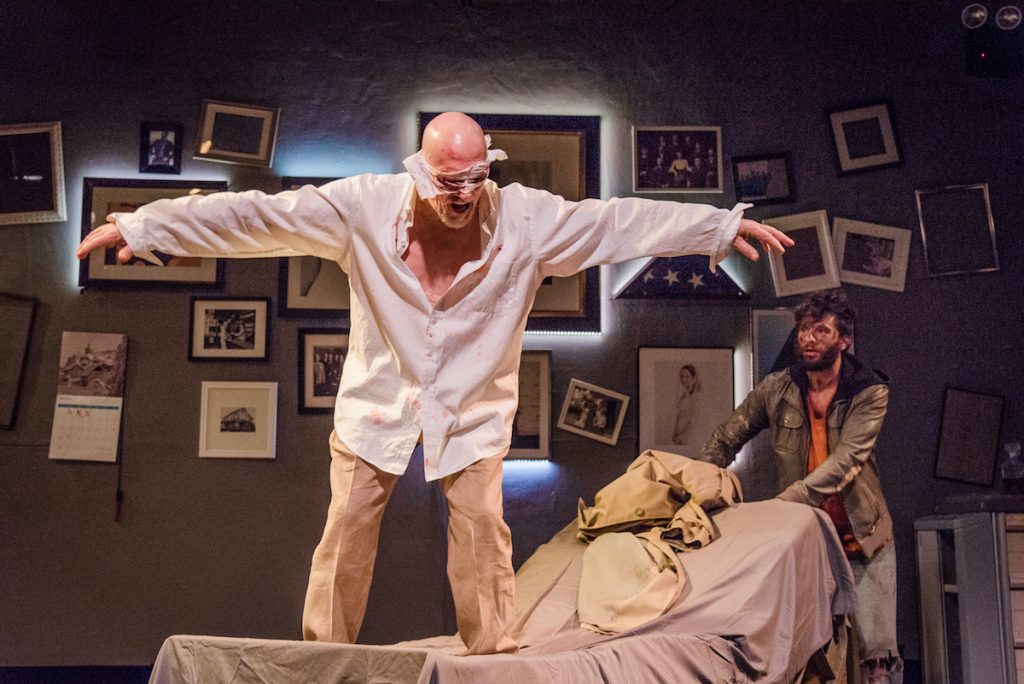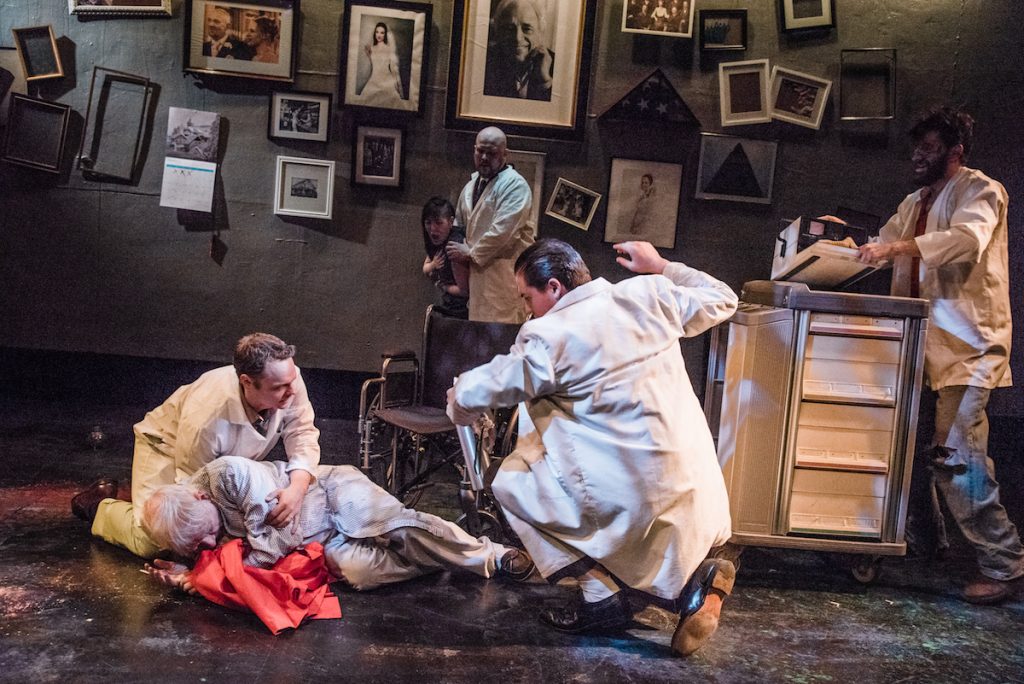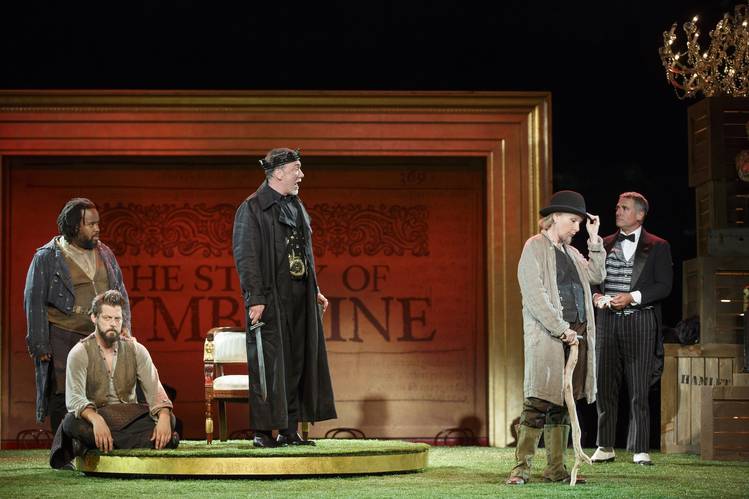

by JK Clarke
Anyone who’s ever walked the halls of a nursing home has seen numerous rooms in which sat a forlorn looking elderly person, lost in a haze of senility or Alzheimer’s. And many of us have undoubtedly wondered what might be going through that person’s mind, or where they were traveling at that very moment. Well, that’s the jumping off point for The Secret Theatre’s inventive and contemporary production of one of Shakespeare’s most intense plays, King Lear.
Even to the the novice, the story is familiar: the aging King of Britain attempts to divide his kingdom among his three daughters, allotting them portions based on their ability to profess their love for him before the assembled crowd. His favorite daughter, Cordelia, however, refuses to pander. Piqued, he banishes her. But before long he is betrayed by the other two daughters, touching off madness in the old king and civil war.


Starring the consistently compelling and creative Austin Pendleton as Lear, this production focuses on the anguish and confusion (probably medical, or at least geriatric) of an aging patriarch; and in particular on the pain of the unexpected betrayal with which he is quite clearly obsessed. At one point Lear asks repeatedly, upon meeting the savage and bedraggled Poor Tom the beggar (disguised and in hiding Edgar, son of the Duke of Gloucester), despite not knowing anything of his family, if the cause of Tom’s madness is his daughters’ betrayal, “Did thou give all to thy daughters? And art thou come to this? . . . Couldst thou save nothing? Wouldst thou give ‘em all?” Lear can only see in another man’s ruin the apparent causes of his own. As far as he’s concerned the ills of the world are caused solely by devious offspring.
Superbly directed by Alberto Bonilla, the production has an almost bi-polar slant. Lear the king begins dividing the kingdom as a dispensation of necessities, with Pendleton, just audible enough for us to hear, rushing through the formalities. It’s another way to tell us that this is a play about buried emotion, like a dream in which we forget what brought us to the action (e.g. a chase or falling of a cliff), but then that action becomes loud and sharply focused. When Lear finds himself homeless in the midst of a tempest, he comes alive, raging, “Blow winds and crack your cheeks!” in an impressively energetic display for the enfeebled monarch. But by the time he finds his old friend Gloucester (the always excellent Richard Mazda) blinded and dying of a broken heart, he practically whispers his greetings and simultaneously demented/ingenious witticisms: “I remember thine eyes well enough. Dost thou squiny at me?” he cajoles, half seriously.


Any good production of King Lear is completely reliant on a solid cast, especially in certain key roles. And Bonilla’s has just the team that works smoothly with Pendleton and possesses the ability to make Shakespeare sound natural in a very contemporary setting—not an easy feat. Zachary Clark’s deliciously deviant Edmund, in fact, is a bastard out of Carolina who’s more Larry the Cable Guy than Lawrence the Olivier. Edmund comes complete with southern twang, sleeveless shirts, and a can of Pabst Blue Ribbon at the ready. Lears’ daughters also are all perfectly cast: Melissa Macleod who moves quickly from sweet child to a menacing Regan; and Elizabeth A. Davis as Goneril, is noticeably (late term) pregnant (by happenstance, I presume) which, in addition to her fine acting, adds a fascinating twist to the role, in which she’s rejecting the past (her father) for the future (her unborn child, who’s listed in the cast bios as Josiah Alexander, playing the role of Lear’s grandson, since he does share the stage); this unusual and unique circumstance make her dalliance with Edmund and subsequent suicide all the more devious and dysfunctional. Most importantly, Meggy Hai Trang’s Cordelia is one of the more believable I’ve seen in quite some time, as Cordelia is often seems unworthy of Lear’s doting. Trang is used in the silent nursing/hospital room prelude (created for this production), as a very loving daughter visiting her ailing father. The father/daughter bond is so touchingly illustrated that Lear’s heartbreak at her loss makes far more sense than it often does.
Other actors that add to the strength of the production are Arthur Lazalde as the loyal Earl of Kent, perfectly cast as a strong, loyal lieutenant to the King; Thomas Muccioli’s flippant and foppish Oswald; and happily, Jack Herholdt’s Fool, whom it would’ve been nice to have see more of (several lines were cut, as fit the context of the production). Herholdt is equal parts mocking and loving of Lear, with his comic timing perfect for the role, adding frivolity to moments dominated by pity.


Small independent Shakespeare productions are generally difficult to pull off. Short run time doesn’t generally allow for a heavy investment in difficult roles or elaborate production quality. But not so with The Secret Theatre which, under the guidance of director Alberto Bonilla and executive director Richard Mazda, continues to produce outstanding Shakespeare plays (last year’s Merchant of Venice was terrific). There shouldn’t be any secret about this company, and as many people (especially younger audiences who haven’t had a lot of Shakespeare exposure) as possible should take this fine opportunity to see an innovative, exciting version of one of the great plays of all time.
King Lear. Through April 9 at The Secret Theatre (44-02 23rd Street, between 44th Road and 44th Avenue) Long Island City). www.secrettheatre.com
Photos: Reiko Yanagi






















